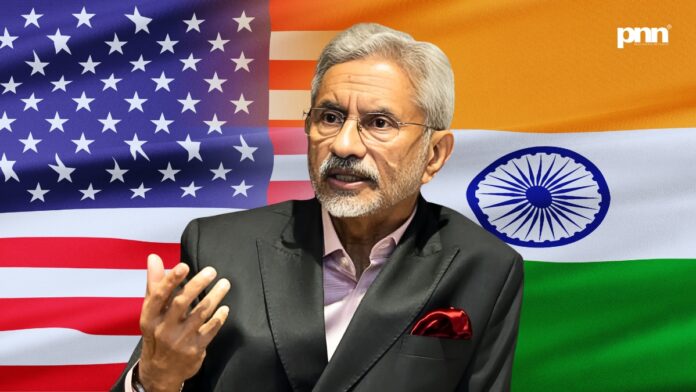New Delhi [India], August 23: External Affairs Minister S. Jaishankar doesn’t do diplomatic fluff. With Washington tightening the tariff screws, he cut through the noise: yes, India-US trade negotiations are still alive. No, India won’t sacrifice its farmers or small producers to appease the White House. In his words, “we have some red lines”, and those are not negotiable.
Tariffs Rising, Patience Running Thin
The India-US trade standoff has been brewing for months. Washington’s latest move is brutal: a 25% extra duty already slapped on Indian goods, with another 25% set to kick in on August 27. That’s a total 50% tariff wall, among the harshest the United States has ever erected against a partner economy.
The trigger? New Delhi’s continued import of Russian oil. President Donald Trump framed the levy as punishment. But the punishment looks more like politics than economics.
Speaking at a World Leaders Forum, EAM Jaishankar didn’t mince words. “Negotiations are still going on in the sense that nobody said the negotiations are off. People do talk to each other. It is not like there’s a kutti there,” he quipped, using the Tamil slang for a child’s sulk.
In other words: don’t mistake disagreement for divorce. The lines are still open. But they aren’t blank cheques.
Agriculture: India’s Immovable Wall
If Washington thought tariffs would bully New Delhi into opening up its farm and dairy sectors, it miscalculated.
“Our red lines are primarily the interests of our farmers and, to some extent, our small producers. We are very determined on that,” EAM Jaishankar declared. “That’s not something we can compromise on.”
This is not just economics; it’s politics. India’s 120 million farmers are the backbone of the country’s food security and a decisive voting bloc. Any Indian government, BJP or Congress, that caves on agriculture is signing its political death warrant.
The US, of course, protects its own farmers fiercely with subsidies and tariffs. But it expects India to drop its guard. That hypocrisy was not lost on EAM Jaishankar’s audience.
Bilateral trade may have crossed $190 billion, but agriculture remains the big rock in the road. New Delhi simply won’t allow American agribusiness to steamroll its rural economy.
Russia Oil: The Convenient Excuse
Trump’s tariff strike is justified in Washington as punishment for India’s crude imports from Moscow. But EAM Jaishankar called out the double standard with surgical precision.
“Europe trades far more with Russia than India does,” he pointed out. “If the argument is energy, they are bigger buyers. If the argument is who is the bigger trader, they are bigger than us.”
Translation: the West is wagging its finger at India while filling Russia’s coffers far more than we ever have.
Then came the knockout punch. On US criticism of India’s oil purchases, EAM Jaishankar scoffed: “It’s funny to have people who work for a pro-business American administration accusing other people of doing business. If you don’t like it, don’t buy it. Nobody forces you to.”
For Washington, that’s about as blunt a dismissal as diplomacy gets.
Trump’s Style: Foreign Policy As Reality TV
Asked about Trump’s hardball tactics, EAM Jaishankar observed that no previous US President has conducted foreign policy so publicly. “That itself is a departure that’s not limited to India… President Trump’s way of dealing with the world, even dealing with his own country, is a very major departure from the traditional orthodox manner of doing so.”
Read between the lines: Trump runs foreign policy like a Twitter brawl, while India still values closed-door negotiation. For a country like India, that prefers strategic patience over public posturing, the contrast couldn’t be sharper.
Commerce Ministry Keeps It “Open-Minded”
Commerce Minister Piyush Goyal, speaking at the same event, tried to strike a conciliatory note. He said India would approach trade talks with Washington with “a very open mind, a positive outlook and the confidence that the India-US relationship is very consequential.”
That’s the friendly face to EAM Jaishankar’s steel spine. Goyal’s optimism keeps the door open. But the substance hasn’t changed: farmers are untouchable, small producers are untouchable, sovereignty is untouchable.
Negotiations Without Breakthroughs
A US trade team had been scheduled to visit New Delhi from August 25–29. That visit has been called off. For Indian exporters, that cancellation means one thing: don’t expect tariff relief before the August 27 hike.
Still, Jaishankar stressed that dialogue continues. “We are two big countries. The lines are not cut. People are talking to each other, and we will see where it goes,” he said.
That’s as close to optimism as it gets in this round. Talks will happen. Concessions? Don’t hold your breath.
Strategic Autonomy: India’s Red Line In Practice
At the heart of EAM Jaishankar’s position is a bigger philosophy: strategic autonomy. India will not allow itself to be boxed into one camp’s dictates, whether on trade, oil, or foreign policy.
“The issue of decisions which we make in our national interest is our right. And I would say that’s what strategic autonomy is about,” he said.
That doctrine is not new. It runs back to Nehru and the Non-Aligned Movement. But under PM Modi and EAM Jaishankar, it comes with sharper teeth. India will buy oil where it wants, sell goods where it wants, and take flak if necessary.
The Road Ahead: Collision Or Compromise?
With tariffs doubling in days, the question is whether Washington blinks or New Delhi adjusts. If neither side moves, Indian exporters, especially in textiles, leather, and machinery, will feel the pinch. But New Delhi’s political calculus is clear: better to absorb economic pain than cave on sovereignty.
India is betting that Washington needs this partnership too much to let tariffs ruin it. And in the long run, that may be true. India is the world’s fastest-growing large economy, and no US President can afford to ignore a $190 billion trade relationship.
For now, though, EAM Jaishankar’s message is simple: negotiations, yes. Capitulation, never.





